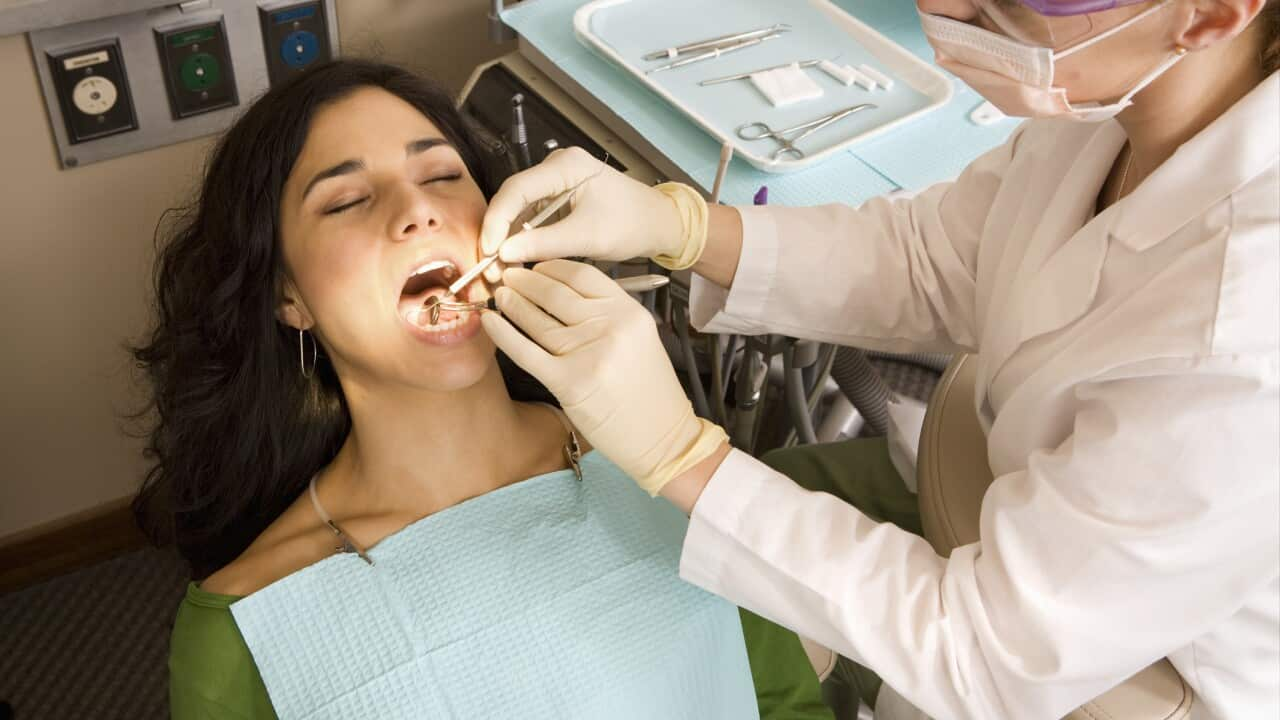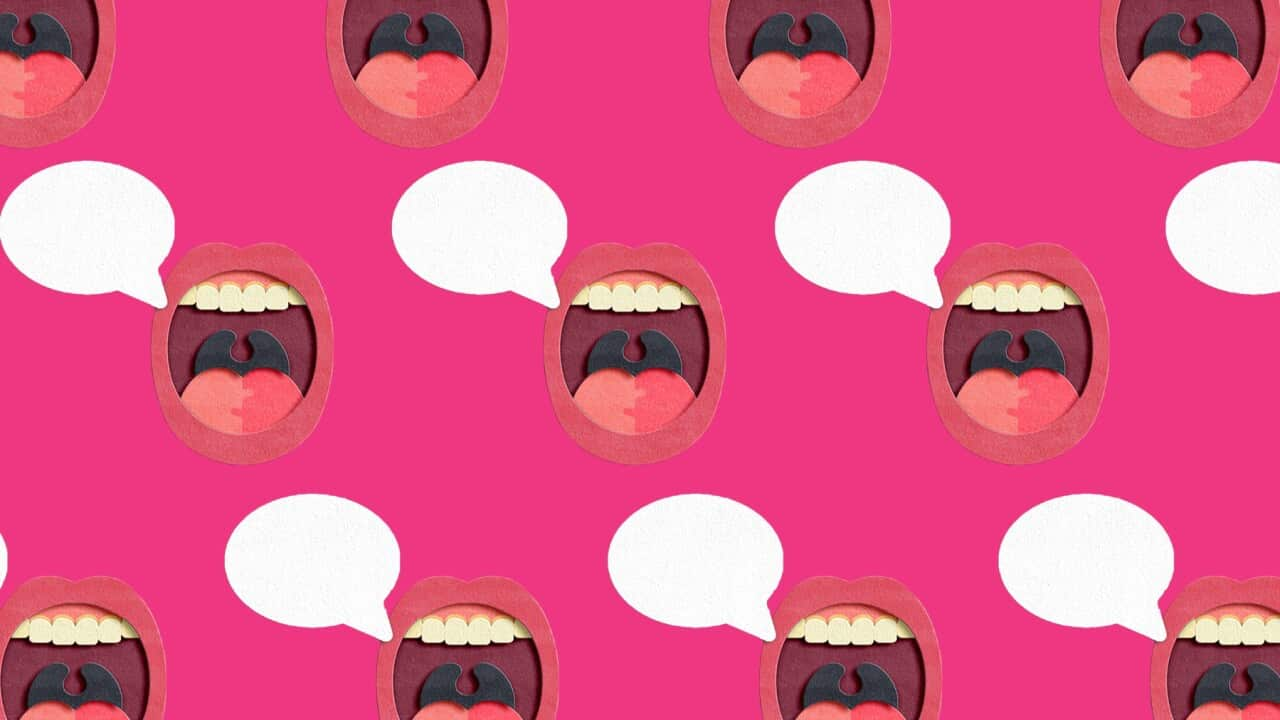This lesson suits upper-intermediate to advanced learners. After listening, to test your learning and like and follow us on for more!
Learning notes
Lesson language objective
Talking about teeth and understanding the dentist’s advice
Different ways to talk about problems with your teeth.
- I think I’ve chipped a tooth.
- I’ve cracked a tooth, and I might need a filling.
- My teeth are sensitive, and my gums bleed when I floss.
- I have a toothache, and my gums are sore.
Colloquial expressions:
To lie through your teeth - means to say a very big lie without any shame. She is lying through her teeth.
To sink/get our teeth into something - means to start working on it with lots of energy and interest. I can't wait to get my teeth into my new book. This is a project you can sink your teeth into.
Vocabulary:
A chipped/cracked/fractured tooth is a broken tooth.
A dental check-up is a professional examination of teeth, gums and mouth.
Dental crowns are tooth-shaped caps placed on top of damaged teeth.
Dental X-rays are photographs of teeth that dentists use to identify tooth problems.
A filling is a material used to repair broken teeth.
Flossing means cleaning between your teeth using a thin thread, called dental floss.
Gingivitis is a very common illness of the gum tissue or gingiva.
Gums or gingivae are part of the soft tissue, flesh that surrounds the base of the teeth in your upper and lower jaw.
Mouth sores or ulcers are small and painful wounds in a mouth that make eating and talking uncomfortable.
Sore is painful or aching.
A tooth cavity is a hole in a tooth structure caused by tooth decay.
Tooth decay is a tooth disease caused by harmful bacteria that develops gradually.
Toothache is a pain in one or more teeth.
Wisdom teeth are the very last molars (back teeth).
Cultural information:
Through , parents with children aged 0-17 can access a dental benefits program called the Child Dental Benefits Schedule or CDBS, which assists with payment for many basic dental services for children. You can use the CDBS when you visit a public dentist and also at most private dentists.
Medicare doesn't cover the costs of dental services for adults in the way it covers other health services. Many Australians use private health insurance to pay for dental care, and most health funds will only pay about half of the cost, so you will need to pay the rest yourself. 

Little girl learning how to brush her teeth. Source: Getty Images/ Digital Vision
Transcript
(Note: This is not a word-for-word transcript)
Hi! Welcome to the SBS Learn English podcast, where we help Australians to speak, understand and connect.
My name is Josipa, and like you, I'm still learning English. In this episode, we’ll look at some important vocabulary you can use when you visit a dentist.
We’ll also find out if Medicare covers dental care and how can you benefit from the government program called the Child Dental Benefits Schedule.
If someone tells me that they love going to the dentist, I think they are lying through their teeth.
We say that someone is lying through their teeth when we think they are telling a very big lie and they are not ashamed.
How about you? Do you like going to the dentist? How often do you go? And once you are there, do you know what to say, and do you understand your dentist's advice?
Listen to this conversation between Maryanne and Allan. Today, Maryanne is a patient and Allan is her dentist.
Maryanne:
I think I’ve chipped a tooth, and my gums bleed easily.
I think I’ve chipped a tooth, and my gums bleed easily.
Allan:
Have you got any toothache? Or sore gums?
Have you got any toothache? Or sore gums?
Maryanne:
No, I don’t have any toothache, but my teeth are a bit sensitive, and my gums bleed when I floss.
Allan:
Ok, let’s have a look. Please lie back and open your mouth.
Ok, let’s have a look. Please lie back and open your mouth.
Josipa:
We heard some useful phrases that can help us communicate concerns about our teeth.
We heard some useful phrases that can help us communicate concerns about our teeth.
Let’s go through them one by one.
First, Maryanne said,
I think I’ve chipped a tooth, and my gums bleed easily.
Maryanne chipped her tooth. That means that a small piece of her tooth broke off, and now she can feel its sharp edges.
If you have a chipped tooth, you could also say, “I think I’ve cracked a tooth”. Or maybe your dentist will say, “You have a fractured tooth”, and that would mean the same thing.
Then Maryanne said that her gums bleed easily. Gums are part of the soft tissue, flesh surrounding the base of the teeth in your upper and lower jaw.
Allan then asked Maryanne,
Have you got any toothache? Or sore gums?
If you have a toothache, you are experiencing pain in your tooth or your teeth.
And since teeth don’t just hurt for no reason, the best thing to do is to see your dentist as soon as possible.
But, let's say that you can't see your dentist immediately and don't want to suffer the pain.
You could go to your local pharmacy and say, "I have a terrible toothache, and I need some painkillers".
Allan also asked Maryanne if she had sore gums.
Sore gums could mean you have gingivitis, a very common illness that affects the gum tissue.
If you have sore gums, it means that you have pain in the gums, usually when brushing or flossing.
Flossing means cleaning between your teeth using a thin thread called dental floss.
We already know that Maryanne cleans her teeth with dental floss because we heard her say that her gums bleed when she flosses.
But before that, Maryanne said something else,
My teeth are a bit sensitive.
If we feel pain when we drink something very cold or hot we can say that our teeth are sensitive.
At the end of the conversation, our dentist Allan asked Maryanne to lie or lean back in the dentist's chair, so that he could have a look inside her mouth.
Now, let’s imagine that Allan has finished with Maryanne’s dental check-up, which means that he has made a thorough examination of her teeth, gums and mouth.
Allan:
A filling has come out, and there’s a bit of decay so I’m afraid that I won’t be able to replace it easily. You’re going to need a crown.
A filling has come out, and there’s a bit of decay so I’m afraid that I won’t be able to replace it easily. You’re going to need a crown.
Maryanne:
Oh dear, that sounds painful and expensive. Is everything else is ok?
Oh dear, that sounds painful and expensive. Is everything else is ok?
Allan:
Not quite. There is also some inflammation of the gums, and there is a cavity forming in one of your teeth at the back. Is it OK we take some X-rays to see if there is any more decay anywhere between the teeth?
Not quite. There is also some inflammation of the gums, and there is a cavity forming in one of your teeth at the back. Is it OK we take some X-rays to see if there is any more decay anywhere between the teeth?
Maryanne:
Sure. But the cavity you mentioned, will you have to do any drilling?
Sure. But the cavity you mentioned, will you have to do any drilling?
Allan:
Yes, I’ll have to drill to remove the decay, but don’t worry, I’ll give you an injection, so you won’t feel a thing.
Yes, I’ll have to drill to remove the decay, but don’t worry, I’ll give you an injection, so you won’t feel a thing.
Josipa:
Poor Maryanne. It looks like she'll have to visit her dentist more than once. Did you understand everything Allan said?
Poor Maryanne. It looks like she'll have to visit her dentist more than once. Did you understand everything Allan said?
He said plenty, so we better get our teeth into it straight away.
To get your teeth into something means to start working on it with lots of energy and interest. You can also say ‘sink your teeth’ instead of ‘get your teeth’ into something.
First, Allan said,
A filling has come out, and there’s a bit of decay.
"So I’m afraid that I won’t be able to replace it easily. You’re going to need a crown."
A filling has come out; there's a bit of decay, and Maryanne will need a dental crown.
Here, a filling is what dentists use to repair teeth that have a hole in them.
And if you have a cracked tooth, like Maryanne, you could say, "I've chipped a tooth, and I think I might need a filling".
Maryanne also has a bit of tooth decay, a tooth disease caused by harmful bacteria. It can develop over time if we don’t keep our teeth clean.
Dental crowns are tooth-shaped covers or caps the dentist put over damaged teeth.
Let’s hear what else Allan said that there s also some inflammation of the gums and,
There is a cavity forming in one of your teeth at the back.
"Is it OK we take some X-rays to see if there is any more decay anywhere between the teeth? "
Inflammation of the gums means that your gums are swollen and painful.
A cavity forms in your teeth when the decay makes a hole in your tooth. So, a cavity is basically a hole in your tooth.
Allan thinks they should take X-rays of Maryanne's teeth. Dental X-rays are photos of the teeth that dentists use to look for any dental problems they can’t see easily, such as tooth decay between the teeth.
At the end of the conversation, Allan said he would give Maryanne an injection before he drilled her tooth so that she won't feel a thing.
That means that she won’t feel any pain or discomfort.
It’s time to talk to our guest. Today I’ve invited my manager Janine because she and her kids make regular visits to the dentist.
Hi Janine, thanks for sharing your experience.
Janine:
Hi Josipa. Well, I started taking my kids for a dental check-up as soon as they began to have milk teeth, you know, the first baby teeth they get when they are very young. And I did that because I wanted them to get used to going to the dentist and to understand that regular early check-ups can help to prevent cavities and tooth decay. The earlier a dentist can find any of these problems, the less treatment they will need and the less painful it’ll need to be.
Hi Josipa. Well, I started taking my kids for a dental check-up as soon as they began to have milk teeth, you know, the first baby teeth they get when they are very young. And I did that because I wanted them to get used to going to the dentist and to understand that regular early check-ups can help to prevent cavities and tooth decay. The earlier a dentist can find any of these problems, the less treatment they will need and the less painful it’ll need to be.
Josipa:
Yes, that makes sense. And I think it’s also good for kids to learn about how to take good care of their teeth as soon as possible.
Yes, that makes sense. And I think it’s also good for kids to learn about how to take good care of their teeth as soon as possible.
Janine:
Absolutely. Also, taking your child to the dentist early in their life helps them to become familiar with the dental office, so that it is not something they are afraid of.
Absolutely. Also, taking your child to the dentist early in their life helps them to become familiar with the dental office, so that it is not something they are afraid of.
Josipa:
I agree, but dentists in Australia can be pretty expensive; not everyone can afford them.
I agree, but dentists in Australia can be pretty expensive; not everyone can afford them.
Janine:
I know, but parents with children aged 0-17 can access a dental benefits program called the Child Dental Benefits Schedule or CDBS through Services Australia. This program can help with payment for your child’s basic dental services like check-ups and fillings. You can use the CDBS at most dentists. When you book an appointment, ask if you can use CDBS.
I know, but parents with children aged 0-17 can access a dental benefits program called the Child Dental Benefits Schedule or CDBS through Services Australia. This program can help with payment for your child’s basic dental services like check-ups and fillings. You can use the CDBS at most dentists. When you book an appointment, ask if you can use CDBS.
Josipa:
And what about adults? Does Medicare cover dental care?
Janine:
Unfortunately, no, Medicare doesn't cover the costs of dental services the same way it does with other health services. So, some Australians use private health insurance to pay for dental care. But most health funds will only pay some of the cost of a visit to the dentist, so you still need to pay the rest yourself.
Unfortunately, no, Medicare doesn't cover the costs of dental services the same way it does with other health services. So, some Australians use private health insurance to pay for dental care. But most health funds will only pay some of the cost of a visit to the dentist, so you still need to pay the rest yourself.
Josipa:
And, as someone who has a lot of experience in dealing with dentists, do you have any advice you can give us?
And, as someone who has a lot of experience in dealing with dentists, do you have any advice you can give us?
Janine:
I always ask whether I really need whatever the dentist is suggesting, just to make sure. Sometimes I’ll even get a second opinion from a different dentist! But it’s important to look after your teeth. Have you heard the saying “Ignore your teeth and they’ll go away”? No one wants that!
I always ask whether I really need whatever the dentist is suggesting, just to make sure. Sometimes I’ll even get a second opinion from a different dentist! But it’s important to look after your teeth. Have you heard the saying “Ignore your teeth and they’ll go away”? No one wants that!
A big thank you to our educational consultant Professor Lynda Yates, our guests Janine Googan, Minyue Ding, and to Paul Nicholson and Coni Laranjeira who voiced the characters of Allan and Maryanne.







